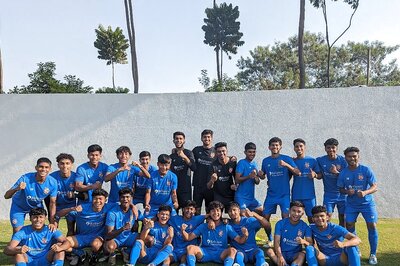
views
Kabul: Ahmad Taki is desperate to get out of Afghanistan, fearing for his life after receiving death threats in midnight phone calls because he works for the Americans. Nine months after applying for a visa to the US designed for cases like his, he's heard nothing and feels abandoned by the people for whom he's risked his life.
Taki is one of about 2,300 Afghans who have applied to a special program that awards US visas to Afghans who have worked for the US government for at least a year and are in danger because of this work.
But since the Afghan Allies program began in 2009, not a single visa has been handed out.
A document obtained by The Associated Press suggests the delays may not be a matter of bureaucracy, but reflect a worry among U.S. officials over holding on to hard-to-replace employees.
"This act could drain this country of our very best civilian and military partners: our Afghan employees," former Ambassador Karl Eikenberry wrote in a February 2010 cable to Secretary of State Hillary Clinton.
"If we are not careful the SIV (Special Immigrant Visa) program will have a significant deleterious impact on staffing and morale, as well as undermining our overall mission in Afghanistan. Local staff are not easily replenished in a society at 28 percent literacy," wrote Eikenberry, who finished his tour in July.
Eikenberry said the strictest criteria should be applied to determine if employees are in danger. He also proposed changing the Afghan Allies legislation so its visas are only issued "in those rare instances where there is clear and convincing evidence of a serious threat." That's more limited that the "ongoing serious threat" stated in the current law.
American officials declined to comment directly on the cable but said Ryan Crocker, the new ambassador, is committed to speeding up the process and that processing time has been reduced by months.
"Ambassador Crocker has resolved to make appropriate Special Immigrant Visa processing a mission priority and we are moving forward," said Megan Ellis, an embassy spokeswoman. She said this did not represent a change from Eikenberry's approach.
The Afghan Allies program is supposed to award up to 1,500 visas each year through 2013. So far, only two applications have been vetted. One was denied, and the other was approved and is going through processing, Ellis said. The application form for the program says a response should be expected within eight weeks.
David Pearce, the embassy's assistant mission chief, said the program started slowly because of the need to establish a procedure for verifying threats, and that delays were not intentional.
"This is not an easy place to do security assessments," he said. "We're going to break the logjam and move this."
Thousands of Afghans are employed by the U.S. military, State Department and USAID, filling a vital role as advisers, technicians, translators and support staff.
But Eikenberry's letter underlines a central dilemma. The U.S. needs qualified Afghan staff to accomplish its mission. On the other hand, the Taliban and other insurgents have directly threatened Afghans working for the U.S. as "traitors" and "collaborators" and - as in Iraq - Washington is under pressure to give asylum to those who helped it. In his memo, Eikenberry warned that 80 percent of the U.S. Embassy's Afghan staffers could potentially seek visas.
Taki began working for the Americans in 2006, at age 17, as an interpreter for U.S. forces in Kabul. Now he is a human resources manager at an international military base in the capital, recruiting Afghans.
He has received phone calls from strangers in the middle of the night saying that they are after him. He worries because so many people have his number and know he works for the international forces. So he wants out.
"I've risked my life. It's been more than four years and now I can't apply for other jobs," because private companies are reluctant to hire people who have worked for the international forces because they're treated as spies, he said.
In 2008, Taki applied to an older program that awards 50 U.S. visas a year to Afghan interpreters. As of mid-July, 379 Afghans had received visas through that program, Ellis said.
But the interpreter program already had a backlog, so Taki applied for the Afghan Allies visa in January. He received a letter saying he should wait to hear about an interview. Thinking that his departure was imminent, he did something he now admits was a little stupid - he quit his part-time studies for a business administration degree, hoping to save money for a new life in the United States.
"I'm still hoping to receive something, but to be honest I'm really frustrated," he said.
There have also been delays in Iraq in an interpreters visa program because of a sharp tightening of security checks for entry to the United States - imposed after a former insurgent entered the U.S. as a refugee and then attempted to send weapons and money to al-Qaida.
Some Afghan visa applicants have banded together to make their plight known. Last month, dozens of anonymous visa applicants sent two open letters to media and U.S. officials protesting the delays.
Afghan applicants worry insurgents will make good on the threats before they ever see a visa. U.S. officials say any immediate security threats should be addressed with supervisors. But some Afghans say their bosses have brushed aside their reports of threats.
One man who works in psychological operations at a Kabul military base said he went to his superiors after insurgents took his picture and said they were going to kill him. The man, who spoke anonymously to protect his job and his visa application, said he was told that it was up to him to defuse the tension and just act friendly next time.
This man said he lies to his relatives about where he works and can no longer go to his hometown, in an insurgent-held part of eastern Afghanistan. He applied for an Afghan Allies visa in January and has heard nothing back.
Some Afghans have given up on the wait for a visa and decided to migrate illegally.
Rafi Hottak, a 25-year-old who worked for the American and British militaries since 2006, waited four years for an interpreter visa. Finally, he paid a trafficker about $15,000 to smuggle him to Britain. He made it to London about two months ago and has applied for asylum.
"There was intimidation and threats against me and my family," he said in a phone interview from London. "I had to take a decision and get away."



















Comments
0 comment